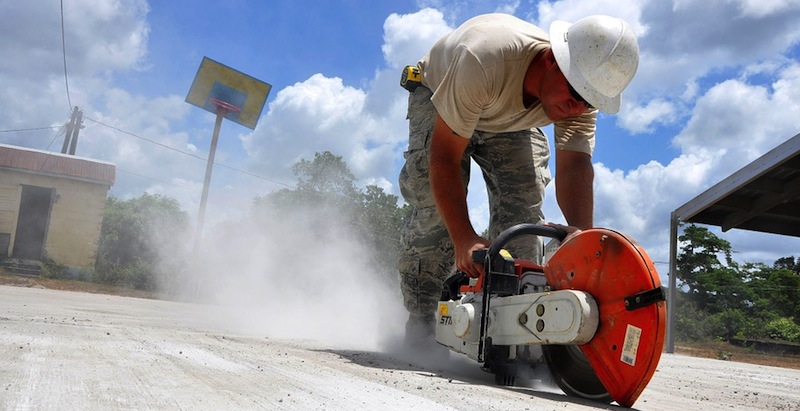The Occupational Safety and Health Administration has announced a final rule to improve protections for workers exposed to respirable silica dust.
OSHA says the rule will help prevent lung cancer, silicosis, chronic obstructive pulmonary disease, and kidney disease in workers by limiting their exposure to respirable crystalline silica. The final rule is written as two standards, one for construction and one for general industry and maritime.
Construction companies have until June 23, 2017 to comply with most requirements. New requirements include:
- Reducing the permissible exposure limit for crystalline silica to 50 micrograms per cubic meter of air, averaged over an eight-hour shift.
- Mandating employers to use engineering controls (such as water or ventilation) and provide respiratory protection when controls are not able to limit exposures to the permissible level
- Limit access to high exposure areas
- Train workers
- Provide medical exams to highly exposed workers.
OSHA says the new regulations, which replace ones established in 1971, provide greater certainty and ease of compliance to construction employers – including many small employers – by including a table of specified controls they can follow to be in compliance without having to monitor exposures. More information is available here.
Related Stories
| Sep 15, 2011
New Label Established For Energy Efficient Doors in UK
The British Fenestration Ratings Council (BFRC) has established a labelling program for all types of domestic pedestrian doors.
| Sep 15, 2011
EPA Releases New High-Rise Residential Energy Star Rating
The U.S. Environmental Protection Agency recently announced an Energy Star rating for multi-family high-rise buildings.
| Sep 15, 2011
Bill Seeks To Spur Stronger Building Codes Nationwide
The Safe Building Code Incentive Act of 2011 would provide strong financial incentives for states to adopt and enforce strong building codes.
| Sep 15, 2011
New Federal Law Limits Amount of Formaldehyde in Wood
President Obama signed into law legislation that limits the amount of formaldehyde in wood. The new measure will impact particle board and other composite wood products .
| Sep 12, 2011
Living Buildings: Are AEC Firms up to the Challenge?
Modular Architecture > You’ve done a LEED Gold or two, maybe even a LEED Platinum. But are you and your firm ready to take on the Living Building Challenge? Think twice before you say yes.
| Sep 8, 2011
OSHA issues alert on incorrectly rebuilt circuit breakers
The Occupational Safety and Health Administration (OSHA) has issued a hazard alert, warning workers and employers of certain Eaton/Cutler-Hammer molded-case circuit breakers that were incorrectly rebuilt.
| Sep 8, 2011
USGBC Streamlines LEED EB: O&M
The Council has reorganized the prerequisite and credit structure of LEED EB: O&M.
| Sep 8, 2011
USGBC: 30 Legislative ‘Wins For Green Building’ So Far In 2011
A mid-year report by the U.S. Green Building Council says that there have been “30 legislative wins for green building” across 22 states in 2011.
| Sep 8, 2011
Revised Building Codes Adopted After WTC Attacks Being Implemented
U.S. National Institute of Standards and Technology (NIST) code revision recommendations in the wake of the World Trade Center terrorist attacks are being implemented in new high-rise construction including One World Trade Center, the lead building of the new World Trade Center complex.
| Sep 8, 2011
New Sustainability Standard Addresses Disaster Resistance
To aid local governments to adopt high-performance green building codes, the Portland Cement Association (PCA) and the Institute for Business and Home Safety (IBHS) have developed High Performance Building Requirements for Sustainability 2.0.








